Several months ago, several magazines like Wennuan ("warmth") and Aihsin ("charity") sent students on to the street with magazines reporting on poor, isolated ill people, to ask for donations. However, most of the funds collected were embezzled for personal use. This set off a "charity paranoia" epidemic.
The sales of Wennuan and Aihsin reached 100,000, with a monthly income of NT$10 million. The figures were startling, but also showed that there are more than a few warm-hearted people in society. Unfortunately, they were unable to control the direction the money went in.
Shih Ying of the Humanistic Education Foundation points out that life in modern society is hectic. It makes people prefer to take the easiest path to give charity. So when someone comes to the door they just trustingly donate money. They don't realize that they need to understand how to "manage" charity and to find out exactly where their money is going, otherwise "charity" will lose its positive significance.
"In fact, Taiwan now has more and more people who are willing and able to donate money each month," analyzes National Taiwan University associate professor Hon-yei Annie Yu, but they just don't know where to put their money. Or they don't know about the public reliability of given institutions. They just often see reports in the media or people enthusiastically helping out, and they want to contribute, too.
With the rise of these fraudulent charitable organizations and the weak punishments provided by law, citizen awareness is the best weapon to stop fraud. Professor Yu advises that door-to-door and street solicitations are riskiest; those who want to donate should confirm that the organization involved is legally registered, or, if doubts persist, ask the person soliciting for the organization's postal account number and say you'll donate directly to the account.
People collecting are required by law to show a permit issued by the city Department of Social Affairs. Chen Ming-li, secretary genaral of the Sunshine Foundation of Social Welfare, ROC, has urged people to notify the DSA when they run across unlicensed charitable organizations soliciting donations.
Wang Rung-chang of the Eden Welfare Foundation for the Handicapped says that when his organization campaigns they have clearly marked signs, uniforms, and independent accountants to keep the books. Using independent accountants is a way organizations abroad establish credibility, and, says Professor Yu, this method deserves the attention of charitable groups domesti cally. Writer Lin Ching-hsuan has further proposed that the government, besides enforcing the law on deceptive groups, should also announce and extol the names of reputable ones.
The best example of a publicly recognized charity is the Buddhist Tzu-chi Society. From a start of 30 people donating half a Taiwan dollar every day in 1966, it has grown incredibly. Its members have included President Lee Teng-hui and Lin Yang-kang, president of the Judicial Yuan. Its total accumulated donations have reached NT$1,89 billion, and now they need computers to handle the 400,000-member name list.
Electronics and construction entrepreneur Ho Kuo-ch'ing, who has been approached by the society for the last three years, personally donates NT$10 million per year. The group is licensed by the government, and therefore closely supervised; it publishes updated accounts in each monthly magazine issue; and its own members island wide take direct charge of seeing that the money goes to those who need it most.
Taipei member Lin Sheng-sheng recalls how the priest taught them to have the spirit of "a hen bringing along her chicks." Those who make donations become members, then committee members, recruiting more members in turn. Every member and committee member donates money at fixed times according to their abilities.
Most important is that the 1,500 committee members in the island report on cases of need in every corner, everybody discusses how and what aid should be given, and work is done on the principle of "handle it immediately, handle it intensively, handle it exhaustively." The scope of charitable operations exceeds even that of the provincial Department of Social Affairs.
According to the statistics of the the Tzu-chi Society, in the past twenty-five years already over 220,000 people have been helped, with a total of over NT$920 million paid out to help the indigent with medical care. The NT$800 million Buddhist Tzu-chi General Hospital opened in 1986, and every brick and tile was paid for by charitable contributions.
When Venerable Cheng Yen talks about the goals of the Tzu-chi Society, she says that only 30,000 of Taiwan's 20 million people participate--that's still very few. "If everyone became a member of the Tze-chi Society, then Taiwan would become a Garden Of Eden."
Professor Yu analyzes that one key reason why the Tzu-chi Society is able to attract so many members and so much money is that, besides the nature of its targets themselves, it has a plan, with collection, use, and management methods stipulated clearly. Add to this that the members share a common religious faith that one should personally participate in charity, and naturally there is no problem.
But for today's busy, irreligious modern man, who doesn't want to donate time and doesn't want to misplace money, Professor Yu suggests that "united fund-raising" by a joint government-private organization is most appropriate. And this avoids the pitfalls of door-to-door or street collections.
Professor Yu believes that united fundraising would establish a publicly trusted middleman to handle personnel administration, financial management, and a standard of high quality service, and itself be suitable for periodic supervision and responsibility to contributors.
"The ultimate goal of the activities is to establish a Social Welfare Foundation and Social Welfare United Association, so that social resources can have a reasonable distribution," as Pai Shiu-hsiung, director of the Taipei City Department of Social Affairs, pointed out at several preparatory meetings.
But the idea has problems. Several organizations have responded that they have their own resources. If they participate in united fund-raising, though this would open up new funding sources, it would also give others a share of their "financial empire." Or what if the amount allocated by the united group is inadequate for the needs of the member charity--what then? And you also have to consider contributors with a specific object--the handicapped, the elderly, orphans--will proportionate divvying up of their contributions affect their willingness to give? There are also doubts that those in charge could divide up the money fairly, or be fully aware of each organization's situation.
Despite the aftereffects of the charity magazine debacle, this event has caused many to realize that charity is not just giving money. Many organizations have undertaken educational activities, like the "Charity Needs Wisdom" campaign of the Eden, teaching people correct donating methods. Social governing agencies have been even more active trying to block deceptions. This event may turn out to be, for those who really deserve charity, "snatching victory from the jaws of defeat."
[Picture Caption]
The 7-11 "Bring Back What's Ours" charitable activities unfolded in October; familiar celebrities were invited to help out. (photo courtesy of the Chuchueh Cultural Enterprise Company)
The Tzu-chi Volunteer Service Corps is affiliated with the Tzu-chi General Hospital's Department of Social Services; a member is helping take a patient's blood pressure.
Monks and nuns behind the Buddhist Tzu-chi Society help themselves, making candles or bean milk powder to maintain themselves.
The Hualien Buddhist Tzu-chi General Hospital was made entirely using do nations by philanthropic people, to the benefit of the people of Hualien. The entrance has a depiction of Buddha asking after the ill.
Many charitable activities invite famous stars or singers who help incre ase the attraction. (Sinorama file photo)
A monk comes to beg for alms as winter comes over Tihwa Street, crowded with people buying New Year's products. (photo by Wen Chin Yang)
International superstar Stevie Wonder, because he has lost his own vision, makes donations for the blind everywhere he goes. The photo shows Stevie at his Taipei concert last year, receiving flowers from a representative of the Chi-ming School for the Blind as thanks for his contribution. (photo by Arthur Cheng)
Handicapped groups have discovered that welfare must be won for oneself; the Eden organization invited handicapped friends to the opening of the new train station to assess the facilities for the handicapped. (photo by Wen Chin Yang)
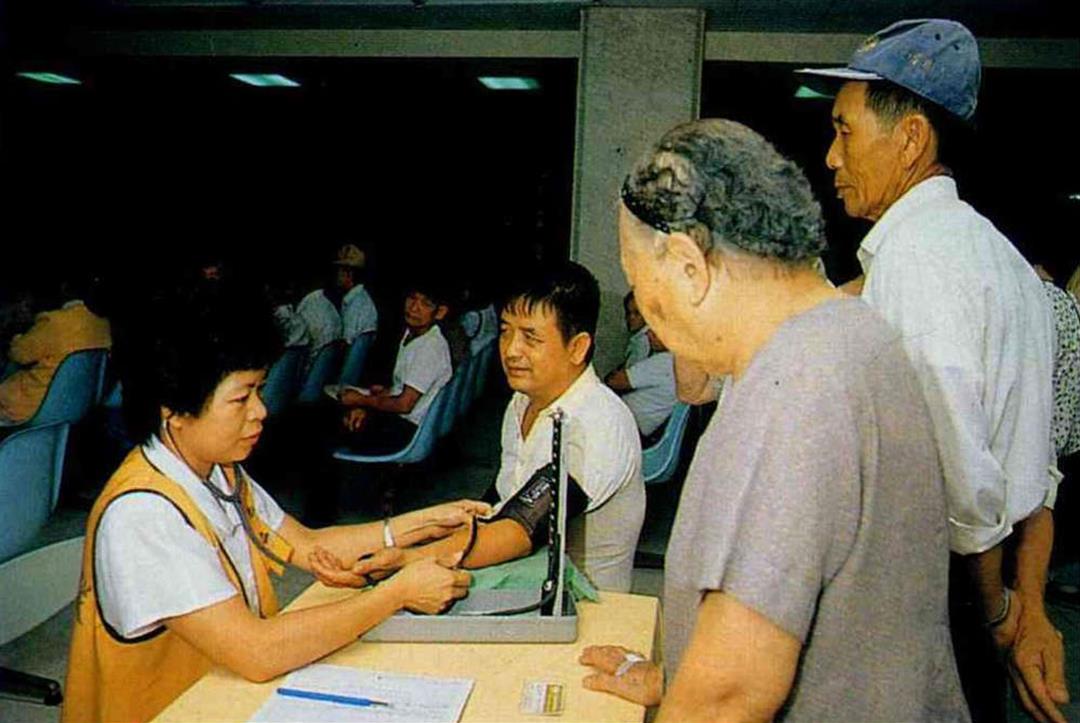
The Tzu-chi Volunteer Service Corps is affiliated with the Tzu-chi General Hospital's Department of Social Services; a member is helping take a patient's blood pressure.
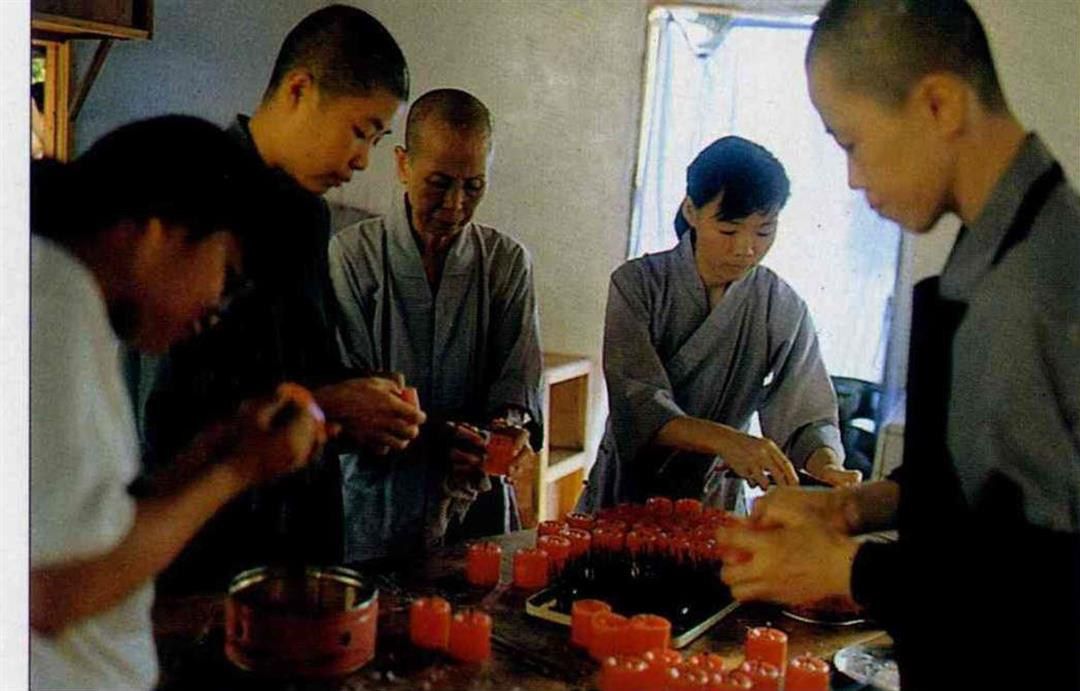
Monks and nuns behind the Buddhist Tzu-chi Society help themselves, making candles or bean milk powder to maintain themselves.
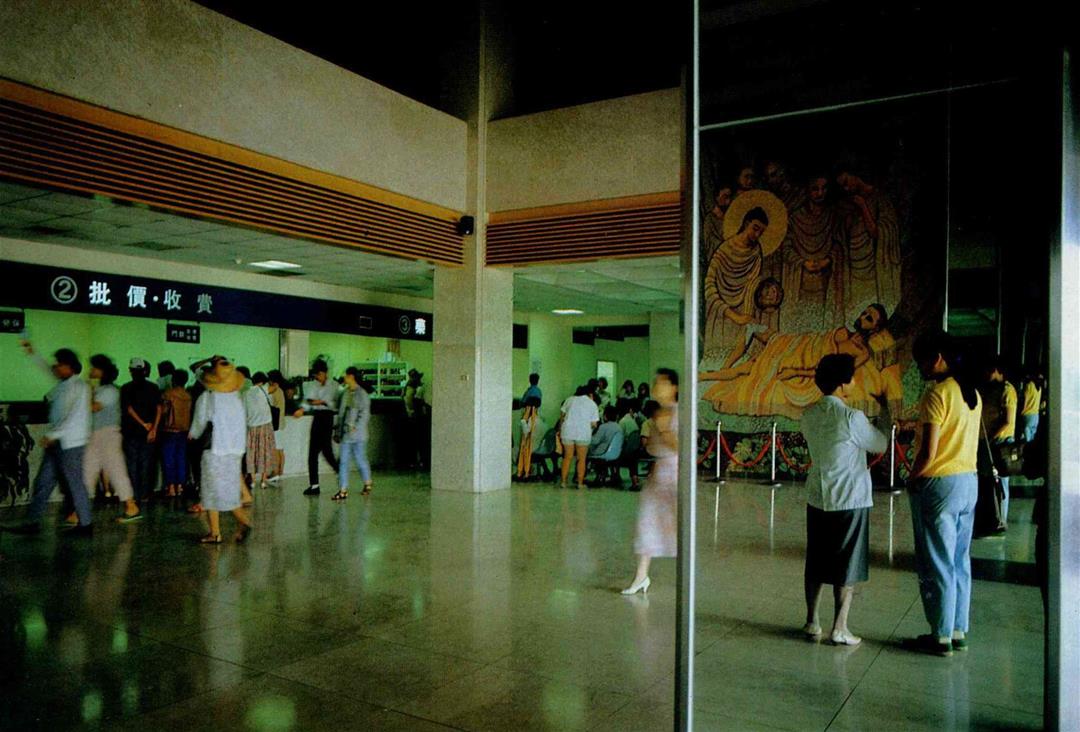
The Hualien Buddhist Tzu-chi General Hospital was made entirely using do nations by philanthropic people, to the benefit of the people of Hualien. The entrance has a depiction of Buddha asking after the ill.
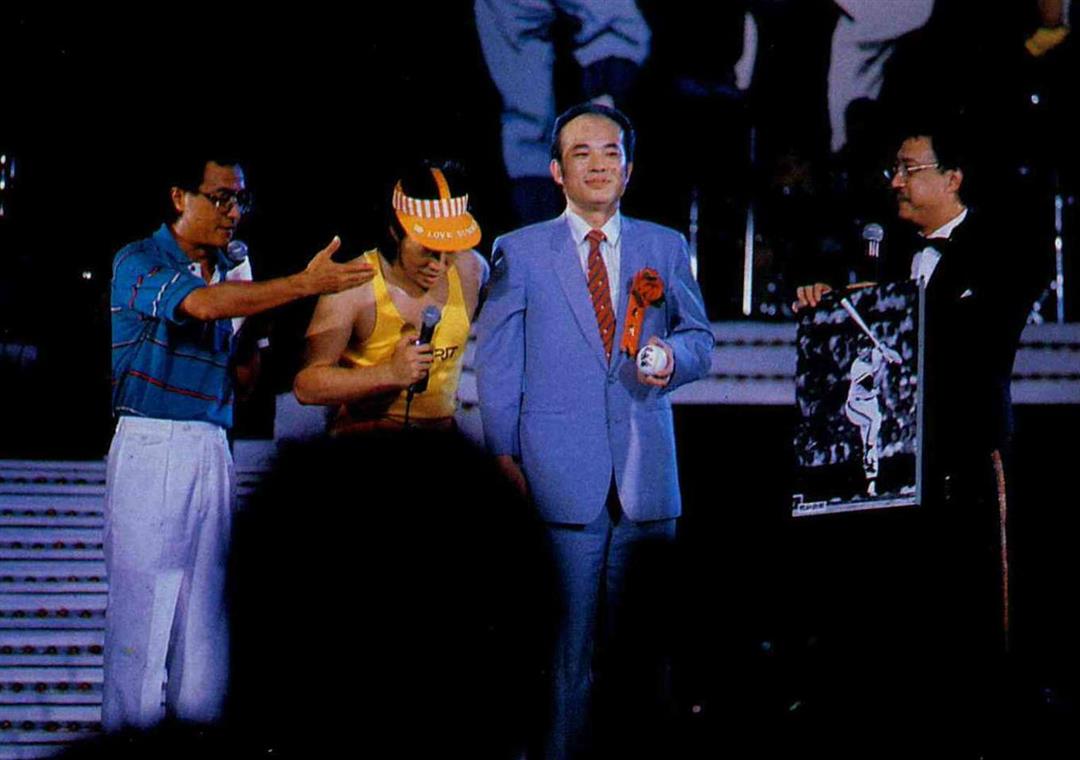
Many charitable activities invite famous stars or singers who help incre ase the attraction. (Sinorama file photo)
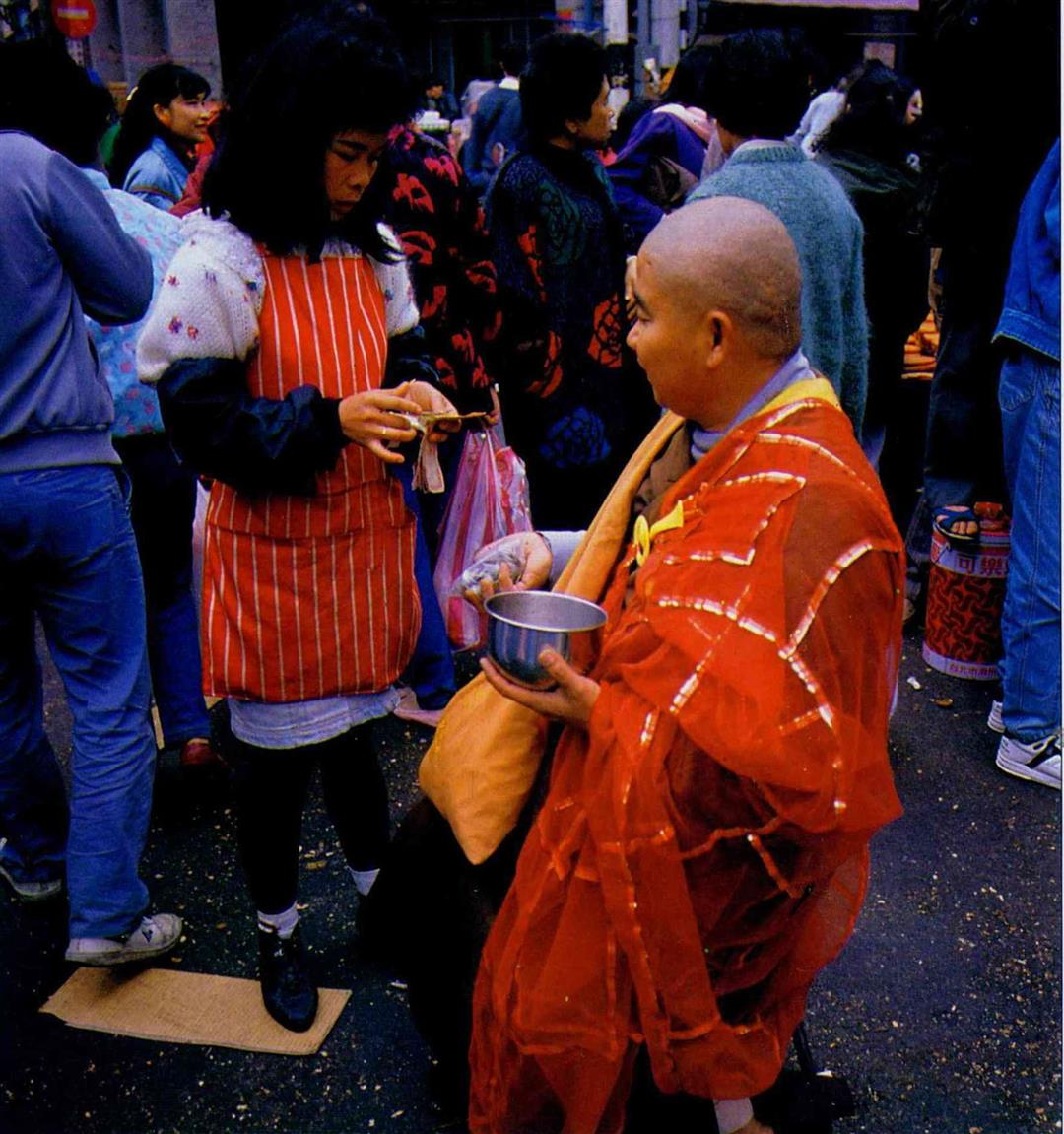
A monk comes to beg for alms as winter comes over Tihwa Street, crowded with people buying New Year's products. (photo by Wen Chin Yang)

International superstar Stevie Wonder, because he has lost his own vision, makes donations for the blind everywhere he goes. The photo shows Stevie at his Taipei concert last year, receiving flowers from a representative of the Chi-ming School for the Blind as thanks for his contribution. (photo by Arthur Cheng)
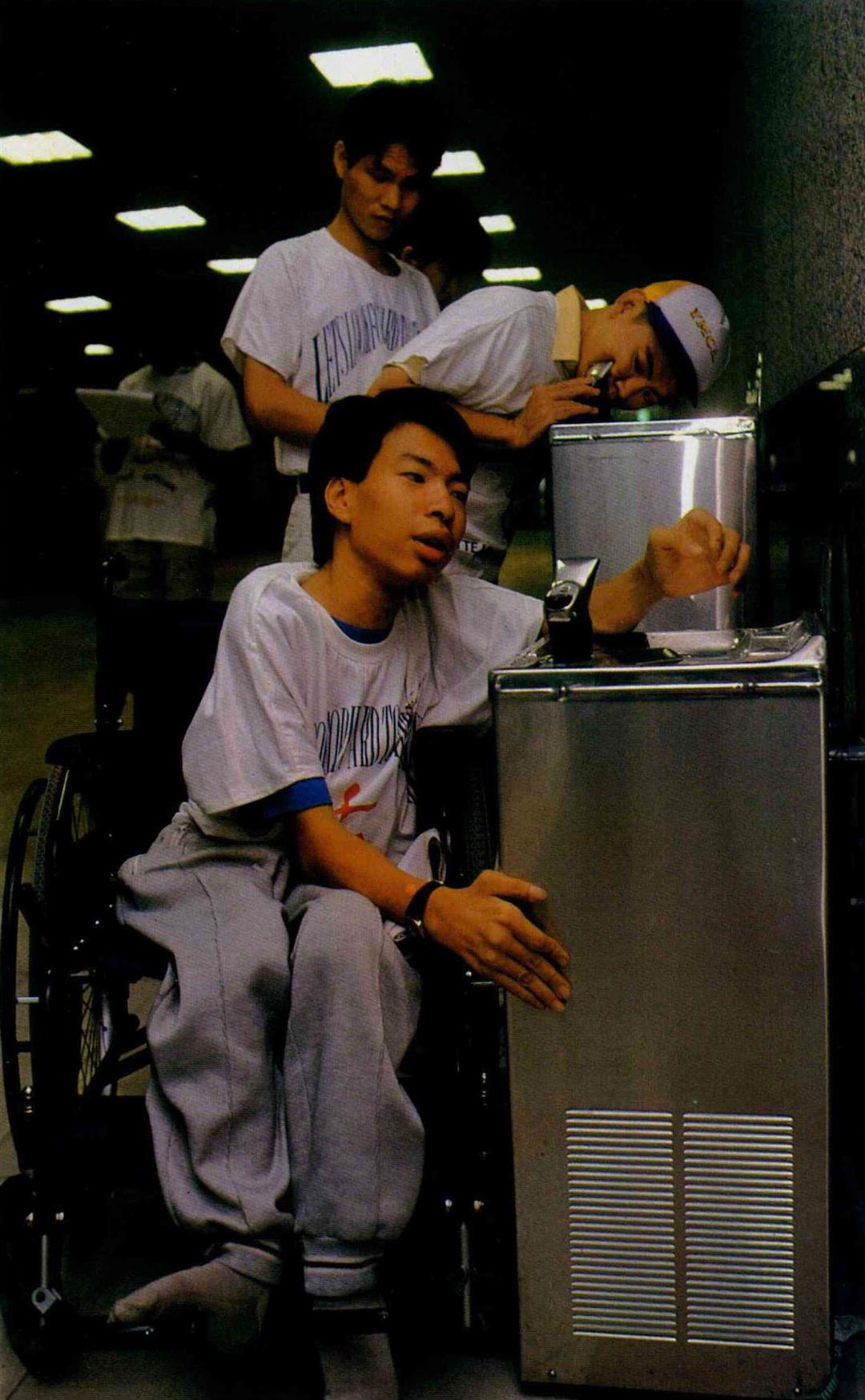
Handicapped groups have discovered that welfare must be won for oneself; the Eden organization invited handicapped friends to the opening of the new train station to assess the facilities for the handicapped. (photo by Wen Chin Yang)